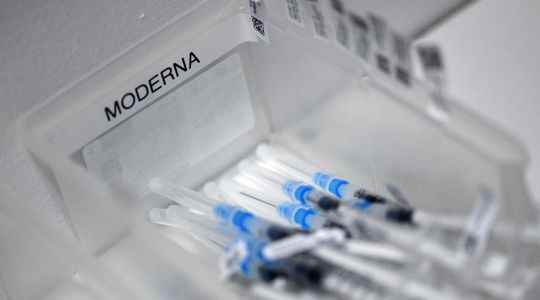Could these be the first steps of future injections against Covid-19? The American laboratory Moderna unveiled a new vaccine at the start of the week intended to fight against variants of SARS-Cov-2. In a study currently in pre-publicationand which has not yet been reviewed by scientists, the laboratory presents the results of this vaccine targeting both the original strain of the virus and the Beta variant of SARS-CoV 2, discovered at the end of 2020 This mode of action, qualified as “bivalent”, should allow a stronger immune response against the variants.
To measure the effectiveness of the vaccine in generating an immune response, Moderna scientists compared the levels of antibodies produced after a booster vaccination with the classic vaccine, and those obtained after the “bivalent” booster. “These results show that this vaccine, by combining the two variants, makes it possible to improve the immune response against Beta, but also on the other variants: the introduction of the delta variant extends the vaccine protection on all the other known strains” , deciphers Odile Launay, infectious disease specialist at Cochin hospital in Paris and member of the Covid-19 vaccines committee.
Thus, according to this study, patients who received a booster dose of the new vaccine generated a level of antibodies against the Omicron variant more than twice as high as those who received a booster dose of the existing Moderna vaccine. Even better, this level of protection persisted for 6 months against the Omicron variant. “These results are really interesting, but for the moment they require confirmation, because we are not yet able to say whether this response is linked to the combined use of the RNAs of the original strain and the Delta variant, or whether the rise of antibodies is only linked to the target of this variant”, moderates Xavier de Lamballerie, specialist in emerging diseases at the University of Aix-Marseille and also member of the Covid-19 vaccines committee. “Anyway, this is the first bivalent vaccine for which we have data, and they are very encouraging,” he adds.
The future of vaccines will be multi-faceted
Since the start of the vaccination campaign, products from Pfizer and Moderna, two RNA vaccines developed to respond to the historic strain of the virus, have shown great effectiveness in protecting against severe forms of Covid. But their effectiveness against infections has waned in the face of virus variants capable of circumventing the immune response to the vaccine. Scientists have been working for several months on adapting these vaccines to make them more robust against these new strains. “These results indicate that bivalent booster vaccines can induce antibody responses providing a novel tool in response to emerging variants,” Moderna said in a communicated.
Thus the Vaccine Strategy Guidance Council (COSV) recommended February 24 to diversify the supply of vaccines in the future, by using “multivalent” vaccines for second booster injections. “For this additional reminder, the COSV recommends the use of a multivalent RNA (or protein) vaccine if possible. If such a vaccine is not available or has not shown sufficient efficacy or tolerance by there, it will be necessary to promote the use of RNA vaccine (or protein) based on the ancestral strain”, he underlined. The Council also recalled that the Beta strain could represent a particularly interesting base, since “studies have shown that a primary infection with the Beta variant induces a broad response spectrum”.
Other laboratories in the race
For Moderna, this first vaccine is perhaps only a step towards an even more efficient product. According to the president of the laboratory, Stéphane Bancel, another bivalent vaccine which this time combines the original strain with the Omicron strain “remains our main candidate” for a vaccination campaign which could take place in the fall. According to Moderna, the results of this vaccine are expected in the spring. Other laboratories are also working to develop bivalent vaccines. The French Sanofi is thus in the process of developing a recombinant protein vaccine (a more “classic” mode of action), which is based on both the original strain and the Beta variant and could be administered as a booster, while such as the Spanish HIPRA laboratory.
“These data are important, they should make it possible to know in the long term which vaccine we will need for the recall in the general population”, explains Odile Launay. By defining the most effective modes of action, and by measuring the response of the vaccine to the variants in circulation, the scientists hope to be able to design a vaccine capable of offering lasting and robust protection against Covid-19. “Questions are still pending, should we add Omicron in future vaccines when we know that this variant will have an end? In the end, what will prevail will be the ability of the vaccine to protect us against the forms serious in the face of a wide variety of strains of the virus”, recalls Xavier de Lamballerie. Answers that should become clearer in the coming months.
